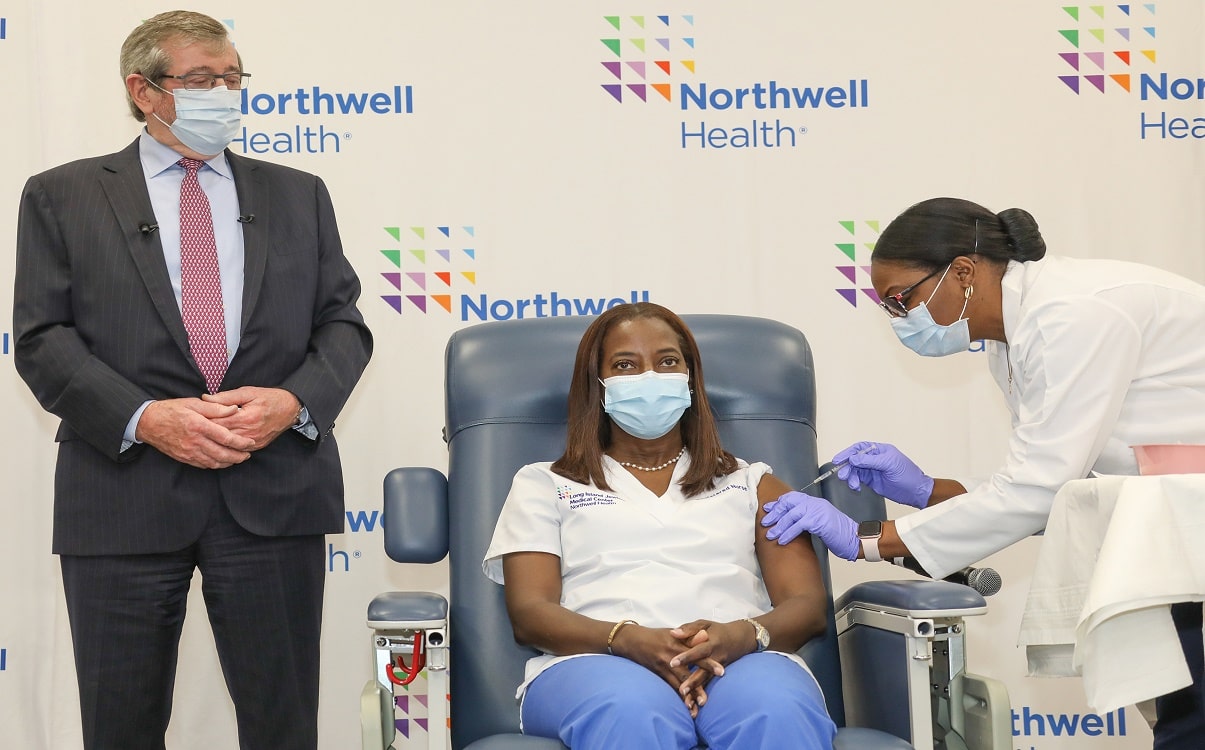Items From First COVID-19 Vaccination Heading To Smithsonian Museum
- TDS News
- Breaking News
- March 9, 2021

Long Island Jewish Medical Center nurse Sandra Lindsay’s historic first Pfizer-BioNTech vaccine will now be part of the National Museum of American History Collections
TDS News – When Northwell Health nurse manager Sandra Lindsay received the first injection of the Pfizer-BioNTech COVID-19 vaccine last December, the nation tuned in to watch a turning point in the pandemic. That milestone moment turned out to be historic. Northwell today announced that the items used as part of the first FDA-approved COVID-19 vaccine in the United States have been donated to the Smithsonian’s National Museum of American History, where they will join the museum’s medical collection.
Northwell donated materials documenting the first doses, which took place on December 14, 2020, at Long Island Jewish (LIJ) Medical Center, as well as objects related to vaccine distribution and efforts to encourage the vaccination of frontline health care staff. The donation includes the now empty Pfizer-BioNTech vial that contained the first doses of approved vaccine administered in the U.S., Ms. Lindsay’s original vaccination record card along with her scrubs worn at the event and employee identification badge. Ms. Lindsay, director of critical care services at the hard-hit hospital, was the first person known to receive the vaccine.
“December 14 was a historic moment for all: the day the very first COVID-19 vaccine was administered in the United States,” said Michael Dowling, president and CEO of Northwell Health. “It was our first real sign of hope after so many dark months in the fight against the global pandemic. Northwell was prepared to put shots in arms as soon as the vaccine arrived, not to make history but to protect our frontline workers battling COVID-19 as quickly as possible. But when Sandra Lindsay rolled up her sleeve, we weren’t just showing our team members the safety and efficacy of this groundbreaking vaccine – we were telling the world that our country was beginning a new fight back to normalcy. It was an extraordinary moment, and I thank the Smithsonian for preserving this important milestone.”
As New York State’s largest health system, no provider handled more COVID-positive patients and LIJ stood at the epicenter of the first surge in March and April. Ms. Lindsay was one of thousands of frontline workers who heroically soldiered on and saved countless lives despite personal fears and an unending caseload.
“Having lived through the devastation and suffering created by the virus, I knew I wanted to be part of the solution to put an end to COVID-19,” said Ms. Lindsay. “I hope that when people visit the museum and see all these items that they stop to honor the lives of people who did not make it and remember the loved ones they left behind. I hope it will inspire some discussion and education for future generations.”
In April 2020, the museum formed a rapid-response collecting task force to address the COVID-19 pandemic and document the scientific and medical events as well as the effects and responses in the areas of business, work, politics and culture. Due to health and safety protocols, the museum is only able to bring in a limited number of artifacts into the building. Additional artifacts related to the pandemic will be brought in and processed when the museum returns to full operation.
The Northwell acquisition includes additional vials from doses of the Pfizer-BioNTech and Moderna vaccines administered at Northwell, as well as the supplies needed to prepare, inject and track the vaccinations, such as diluent, syringes and vaccination-record cards. Northwell also donated shipping materials that document the enormous effort required to support vaccine distribution and preserve vaccine potency, such as a specialized vaccine “shipper” that monitors and maintains temperature.
“The urgent need for effective vaccines in the U.S. was met with unprecedented speed and emergency review and approval,” said Anthea M. Hartig, Ph.D, the museum’s Elizabeth MacMillan Director. “These now historic artifacts document not only this remarkable scientific progress but represent the hope offered to millions living through the cascading crises brought forth by COVID-19.”
Northwell’s donation joins the museum’s medicine and science collections that represent nearly all aspects of health and medical practice. Highlights include a penicillin mold from Alexander Fleming’s experiments, Jonas Salk’s original polio vaccine, early genetically engineered drugs and an 1890s drugstore.
The museum is working on a signature 3,500-square-foot exhibition, “In Sickness and in Health,” that will explore efforts to contain, control and cure illnesses over the centuries, thereby shaping the nation’s history. The exhibition will feature artifacts from 19th-century vaccination tools and diagnostic instruments to cardiac implants, imaging technologies and objects from the global smallpox eradication campaign and the COVID-19 pandemic.
Among the museum’s resources related to vaccines and the role of antibodies is a website, “The Antibody Initiative,” and a March 2 virtual program with Dr. Anthony S. Fauci, the director of the National Institute of Allergy and Infectious Diseases. Dr Fauci was presented with the museum’s signature honor, the Great Americans medal, and donated his personal 3D model of the SARS-CoV-2 virion to help represent his pandemic work in the national collections.
The museum’s staff also canvassed the nation, asking what it should collect to document this pandemic. The public can continue to make suggestions at inquiry@si.edu and share their Stories of 2020 at a site that will serve as a digital time capsule for future generations.








